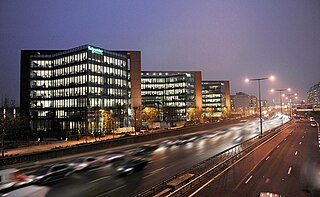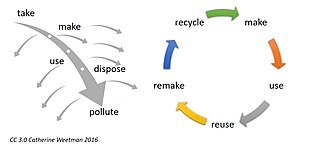Related Research Articles

Polyvinyl chloride is the world's third-most widely produced synthetic plastic polymer. About 40 million tons of PVC are produced each year.

The United Nations Economic Commission for Europe (ECE) is one of the five regional commissions under the jurisdiction of the United Nations Economic and Social Council. It was established in order to promote economic cooperation and integrations among its Member States.

The ASTM International Resin Identification Coding System, often abbreviated RIC, is a set of symbols appearing on plastic products that identify the plastic resin out of which the product is made. It was developed in 1988 by the Society of the Plastics Industry in the United States, but since 2008 it has been administered by ASTM International, an international standards organization.

The United Nations Global Compact is a non-binding United Nations pact to encourage businesses worldwide to adopt sustainable and socially responsible policies, and to report on their implementation. The UN Global Compact is a principle-based framework for businesses, stating ten principles in the areas of human rights, labor, the environment and anti-corruption. Under the Global Compact, companies are brought together with UN agencies, labor groups and civil society. Cities can join the Global Compact through the Cities Programme.
Bottles made of polyethylene terephthalate can be used to make lower grade products, such as carpets. To make a food grade plastic, the bottles need to be hydrolysed down to monomers, which are purified and then re-polymerised to make new PET. In many countries, PET plastics are coded with the resin identification code number "1" inside the universal recycling symbol, usually located on the bottom of the container.

Schneider Electric SE is a French multinational corporation specializing in electrical equipment that is headquartered in Rueil-Malmaison, France. It is also based at the World Trade Center of Grenoble.

The United Nations Volunteers (UNV) programme is a United Nations organization that contributes to peace and development through volunteerism worldwide.

WRAP is a British registered charity. It works with businesses, individuals and communities to achieve a circular economy, by helping them reduce waste, develop sustainable products and use resources in an efficient way.

The International Trade Centre (ITC) is a multilateral agency which has a joint mandate with the World Trade Organization (WTO) and the United Nations (UN) through the United Nations Conference on Trade and Development (UNCTAD).
Borealis AG is an Austrian chemical company which is the world's eighth largest producer of polyethylene (PE) and polypropylene (PP). It is headquartered in Vienna, Austria.

The United Nations Department of Economic and Social Affairs is part of the United Nations Secretariat and is responsible for the follow-up to major United Nations Summits and Conferences, as well as services to the United Nations Economic and Social Council and the Second and Third Committees of the United Nations General Assembly. UN DESA assists countries around the world in agenda-setting and decision-making with the goal of meeting their economic, social and environmental challenges. It supports international cooperation to promote sustainable development for all, having as a foundation the 2030 Agenda for Sustainable Development and the 17 Sustainable Development Goals (SDGs) as adopted by the UN General Assembly on 25 September 2015. In providing a broad range of analytical products, policy advice, and technical assistance, UN DESA effectively translates global commitments in the economic, social and environmental spheres into national policies and actions and continues to play a key role in monitoring progress towards internationally agreed-upon development goals. It is also a member of the United Nations Development Group.

Plastic is material consisting of any of a wide range of synthetic or semi-synthetic organic compounds that are malleable and so can be molded into solid objects.
The Plastics 2020 Challenge is a campaign to reduce the quantity of plastic materials sent to landfill. In 2009, the plastics industry, PlasticsEurope, the Packaging and Films Association (PAFA) and the British Plastics Federation (BPF), launched its Plastics 2020 Challenge campaign in the UK to challenge itself, consumers and government to step up resource efficiency and stop sending plastic materials to landfill. The Plastics 2020 Challenge was named runner-up "Campaign of the Year" for 2009 by Packaging News.

Dionysia-Theodora Avgerinopoulou is an influential politician regarding environmental matters, a specialized attorney in International, Environmental and Sustainable Development Law, and the recipient of the Green Star Award awarded by UNEP, OCHA, and Green Cross International for her leadership in prevention, preparedness and response to environmental emergencies.

A circular economy is an economic system aimed at eliminating waste and the continual use of resources. Circular systems employ reuse, sharing, repair, refurbishment, remanufacturing and recycling to create a close-loop system, minimising the use of resource inputs and the creation of waste, pollution and carbon emissions. The circular economy aims to keep products, equipment and infrastructure in use for longer, thus improving the productivity of these resources. All "waste" should become "food" for another process: either a by-product or recovered resource for another industrial process or as regenerative resources for nature. This regenerative approach is in contrast to the traditional linear economy, which has a "take, make, dispose" model of production.

The World Resources Forum (WRF) is a non-profit organisation for sharing knowledge about the economic, political, social and environmental implications of global resource use. WRF promotes resource productivity among researchers, policymakers, business, NGOs and the public. In addition to organizing international and regional conferences, the WRF Secretariat coordinates multistakeholder dialogue projects, amongst others the Sustainable Recycling Initiative (SRI) as well as the H2020 projects Towards a World Forum on Raw Materials (FORAM), and CEWASTE. The WRF contributes to other EC-projects and projects with the German development organisation GiZ, UNEP and UNIDO.

The Sustainable Development Goals (SDGs) are a collection of 17 global goals designed to be a "blueprint to achieve a better and more sustainable future for all". The SDGs, set in 2015 by the United Nations General Assembly and intended to be achieved by the year 2030, are part of UN Resolution 70/1, the 2030 Agenda.

The UNECE Environmental Performance Review (EPR) is an assessment process to evaluate the progress made by individual countries in improving their environmental policies. The EPRs are carried out under the auspices of the Committee on Environmental Policy of the United Nations Economic Commission for Europe (UNECE).

GreenMantra Technologies is a clean technology company that produces value-added synthetic waxes, polymer additives and other chemicals from post-consumer and post-industrial recycled plastics. These products are used in various applications including roofing and paving, plastics processing, plastics composites, inks and coatings. The company is focused on "up-cycling" recycled plastics into specialty materials, creating a more circular economy for plastics where they are beneficially reused rather than landfilled.
References
- ↑ "VinylPlus - United Nations Partnerships for SDGs platform". sustainabledevelopment.un.org. Retrieved 2018-11-20.
- ↑ "VinylPlus - The Circular Economy". vinylplus.eu. Retrieved 2018-11-13.
- ↑ "VinylPlus - External verification". vinylplus.eu. Retrieved 2019-01-10.
- ↑ "VinylPlus - Recovinyl". vinylplus.eu. Retrieved 2019-01-10.
- ↑ VInylPlus (10 January 2019). "PVC Recycling in Action" (PDF). VinylPlus.
- ↑ "VinylPlus - The VinylPlus Sustainability Forum 2019". vinylplus.eu. Retrieved 2019-02-20.